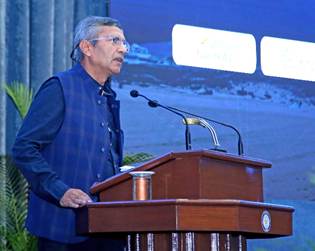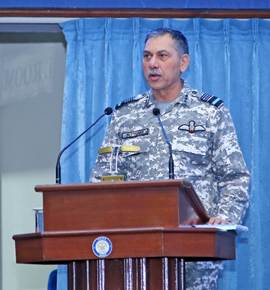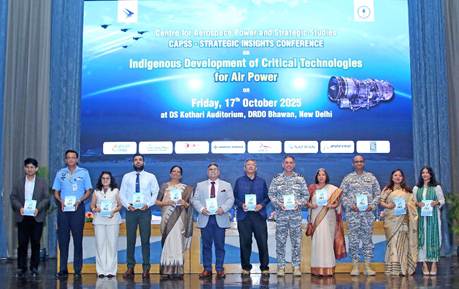Need for a structured policy framework to strengthen India’s domestic industrial base through balanced synergy between public & private sectors: Defence Secretary
Need for a structured policy framework to strengthen India’s domestic industrial base through balanced synergy between public & private sectors: Defence Secretary
Defence Secretary Shri Rajesh Kumar Singh has underlined the need for a structured policy framework to strengthen India’s domestic industrial base through a balanced synergy between public and private sectors. He was delivering the inaugural address at the ‘Strategic Insight Conference on Indigenous Development of Critical Technologies for Air Power’ organised by the Centre for Aerospace Power and Strategic Studies (CAPSS) in New Delhi on October 17, 2025.

The Defence Secretary emphasised that the diversification of the industrial base will end monopolies, enhance ease of doing business, and promote innovation across the ecosystem. He reiterated the Government’s steadfast commitment to Aatmanirbharta in defence, stressing on the importance of developing advanced aero technologies, field evaluation trials, and long-range air-to-air missile systems to strengthen India’s air power capabilities.
In his special address, Vice Chief of the Air Staff Air Marshal Narmdeshwar Tiwari highlighted the contribution of air power in determining strategic results, as seen during Operation Sindoor. He said that apart from capabilities to design and develop indigenous aircraft, India should also prioritise achieving expertise in electronic warfare, advanced sensors, radars, and data links.

In her keynote address, Director General, AERO, DRDO Dr K Rajalakshmi Menon highlighted the disruptive potential of UAVs, multi-sensor fusion, and artificial intelligence in air operations. She spoke of advancements in stealth technology, aerostats, and airships equipped with enhanced sensors, as well as the integration of quantum, photonic, and blockchain technologies in defence systems.
DG, CAPSS Air Vice Marshal (Retd) Anil Golani drew attention to the significance of Aatmanirbharta amid the evolving security environment and the growing technological competition in the neighbourhood. Stressing the need to leverage artificial intelligence, advanced avionics, and next-generation propulsion systems, he emphasised on the development of intelligent control propulsion, super-cruise capability, and fly-by-light systems will define the future of India’s aerospace dominance.

As part of the event, the Defence Secretary released a book ‘Asian Defence Review 2025: Geo-political Shifts and Strategic Partnership Multilateralism in the Indo-Pacific’. Multiple technical sessions covering indigenous jet engine co-development, fighter aircraft programmes, unmanned systems, and strengthening the aerospace production ecosystem were also held.
The conference witnessed senior officials from the Ministry of Defence, the Indian Air Force, DRDO, and industry leaders coming together to discuss India’s journey towards technological self-reliance in the aerospace and defence realms.